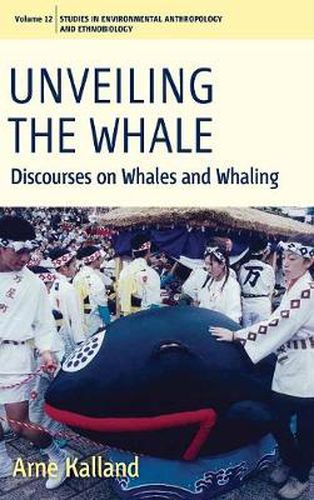Readings Newsletter
Become a Readings Member to make your shopping experience even easier.
Sign in or sign up for free!
You’re not far away from qualifying for FREE standard shipping within Australia
You’ve qualified for FREE standard shipping within Australia
The cart is loading…






This title is printed to order. This book may have been self-published. If so, we cannot guarantee the quality of the content. In the main most books will have gone through the editing process however some may not. We therefore suggest that you be aware of this before ordering this book. If in doubt check either the author or publisher’s details as we are unable to accept any returns unless they are faulty. Please contact us if you have any questions.
Whaling has become one of the most controversial environmental issues. It is not that all whale species are at the brink of extinction, but that whales have become important symbols to both pro- and anti-whaling factions and can easily be appropriated as the common heritage of humankind. This book, the first of its kind, is therefore not about whales and whaling per se but about how people communicate about whales and whaling. It contributes to a better understanding and discussion of controversial environmental issues: Why and how are issues selected? How is knowledge on these issues produced and distributed by organizations and activists? And why do affluent countries like Japan and Norway still support whaling, which is of insignificant economic importance? Basing his analysis on fieldwork in Japan and Norway and at the International Whaling Commission, the author argues how an image of a superwhale has been constructed and how this image has replaced meat and oil as the important whale commodity. He concludes that the whaling issue provides an arena where NGOs and authorities on each side can unite, swapping political legitimacy and building personal relations that can be useful on issues where relations are less harmonious.
$9.00 standard shipping within Australia
FREE standard shipping within Australia for orders over $100.00
Express & International shipping calculated at checkout
This title is printed to order. This book may have been self-published. If so, we cannot guarantee the quality of the content. In the main most books will have gone through the editing process however some may not. We therefore suggest that you be aware of this before ordering this book. If in doubt check either the author or publisher’s details as we are unable to accept any returns unless they are faulty. Please contact us if you have any questions.
Whaling has become one of the most controversial environmental issues. It is not that all whale species are at the brink of extinction, but that whales have become important symbols to both pro- and anti-whaling factions and can easily be appropriated as the common heritage of humankind. This book, the first of its kind, is therefore not about whales and whaling per se but about how people communicate about whales and whaling. It contributes to a better understanding and discussion of controversial environmental issues: Why and how are issues selected? How is knowledge on these issues produced and distributed by organizations and activists? And why do affluent countries like Japan and Norway still support whaling, which is of insignificant economic importance? Basing his analysis on fieldwork in Japan and Norway and at the International Whaling Commission, the author argues how an image of a superwhale has been constructed and how this image has replaced meat and oil as the important whale commodity. He concludes that the whaling issue provides an arena where NGOs and authorities on each side can unite, swapping political legitimacy and building personal relations that can be useful on issues where relations are less harmonious.